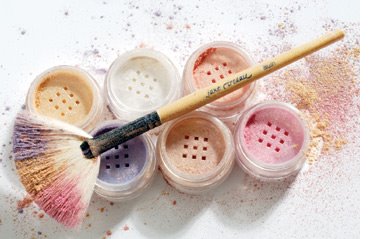A panel of European experts confirm that smelling an irritating fragrance does more than make you sneeze – it could also cause skin problems.
 Your favorite new fashion magazine arrives – and it's no sooner out of the mailbox when your eyes are watering and you’re sneezing uncontrollably. Yup, it's fragrance overload, thanks to those perfume ad samples stuck between every other page.
Your favorite new fashion magazine arrives – and it's no sooner out of the mailbox when your eyes are watering and you’re sneezing uncontrollably. Yup, it's fragrance overload, thanks to those perfume ad samples stuck between every other page.
But what you might not realize is that the rash which erupts on your fingers, hands, arms or face a few hours later, may also be the result of that same fragrance overload.
That’s the conclusion of a panel of experts from the German Federal Institute who say that while studies linking inhalation of fragrance to skin reactions are scarce, the problem definitely exists, particularly in those who already harbor a fragrance sensitivity. And they say, consumers needs to be aware of the potential for trouble.
 Your favorite new fashion magazine arrives – and it's no sooner out of the mailbox when your eyes are watering and you’re sneezing uncontrollably. Yup, it's fragrance overload, thanks to those perfume ad samples stuck between every other page.
Your favorite new fashion magazine arrives – and it's no sooner out of the mailbox when your eyes are watering and you’re sneezing uncontrollably. Yup, it's fragrance overload, thanks to those perfume ad samples stuck between every other page.But what you might not realize is that the rash which erupts on your fingers, hands, arms or face a few hours later, may also be the result of that same fragrance overload.
That’s the conclusion of a panel of experts from the German Federal Institute who say that while studies linking inhalation of fragrance to skin reactions are scarce, the problem definitely exists, particularly in those who already harbor a fragrance sensitivity. And they say, consumers needs to be aware of the potential for trouble.
This may be particularly important for women in the peri-menopause and menopause years, a time when sensitivies to fragrances can sometimes increase. Indeed, in much the way those bouncing hormone levels in pregnancy can cause you to have a negative reaction to a fragrance, the bouncing hormones of mid-life could, at least theortically, have a similar effect - and it's something that anecdotally many middle age women report as true.
Moreover, it's important to note the docs aren't just concerned about the impact of perfumes. The researchers say that scents from personal care products such as shampoos and shower gels, as well fragrances used in room deodorizers, laundry detergents, even artificial scents applied to foods can all trigger skin reactions in those who are sensitive to them.
The panel also expressed concern that fragrance allergies appear to be on the rise – a problem they believe is linked to the bombarding of the senses via the vast number of scented products now on the market. Moreover, it's important to note the docs aren't just concerned about the impact of perfumes. The researchers say that scents from personal care products such as shampoos and shower gels, as well fragrances used in room deodorizers, laundry detergents, even artificial scents applied to foods can all trigger skin reactions in those who are sensitive to them.
Some American experts agree.
" Scent sells – so not only are there definitely more fragranced products in the world, the fragrances themselves are also more complex, and for many people repeated exposures can bring about a constellation of symptoms, " says Tracie DeFreitas Saab, MS, a Human Factors Consultant with the Job Accommodation Network at West Virginia University who frequently works with both employers and employees on work environmental issues.
According American Academy of Dermatology, (ADA) fragrances found in cosmetic products applied to the skin are considered a leading cause of contact dermatitis – a condition that impacts well over 2 million Americans.
And while we have some control over what fragrances come into our personal world – you can always tear out that magazine fragrance insert or switch to an unscented laundry detergent – unfortunately, we frequently don’t have that kind of influence in other environments, including the workplace, or even certain public places such as department stores or restaurants. And for some, that's a real problem.
"Being forced to breathe in other's fragrance choices is a lot like being forced to breathe in second hand smoke – it's a loss of control over your personal environment and for some it can have serious personal health consequences, " says Pamela Dalton, PhD, MPH, an olfactory researcher at the Monell Chemical Senses Center in Philadelphia.
So what can you do to help reduce the assault on your senses from too much fragrance?
1. If the fragrance issue is part of a department store promotion, send a letter to the store’s management expressing your dislike with the idea. Point out the potential for allergic reactions, and for extra kick tell them that shoppers who feel ill in a store frequently leave before they make all their purchases!
2.If the offending fragrance is coming from a co-worker, ask (but do it nicely) if they can tone it down. Explain that because of a concept known as “climatization” we get used to our own fragrance so it doesn’t smell strong to us. But to others, it can be overpowering.
3. If no matter what, Miss Jasmine-Rose-Honeysuckle-Vanilla-Verbena just won’t tone it down, talk to your boss about moving your workstation. Sometimes just relocating a few feet away is enough to reduce your reaction.
4. Ask your boss to spring for a gas-carbon air filter for the office. Unlike a dust filter, those that use carbon can actually help clear the air of odors.
5.If a fragrance sensitivity in your workplace is interfering with your ability to work, and no accommodations are made to help you avoid it, contact the Job Accommodation Network. They frequently act as a liaison between jobs and workers, providing education as well as on-the-job solutions. The American’s With Disabilities Act can also help on a case-by-case basis.
For contact information for both organizations, including phone numbers and websites, click here.
You might also enjoy reading:
Dying For A Change: All Natural Hair Coloring
Mineral Make-Up: Is It Really Natural?
Or visit the RedDressDiary.com - The Source for fabulous women over 40!




































No comments:
Post a Comment